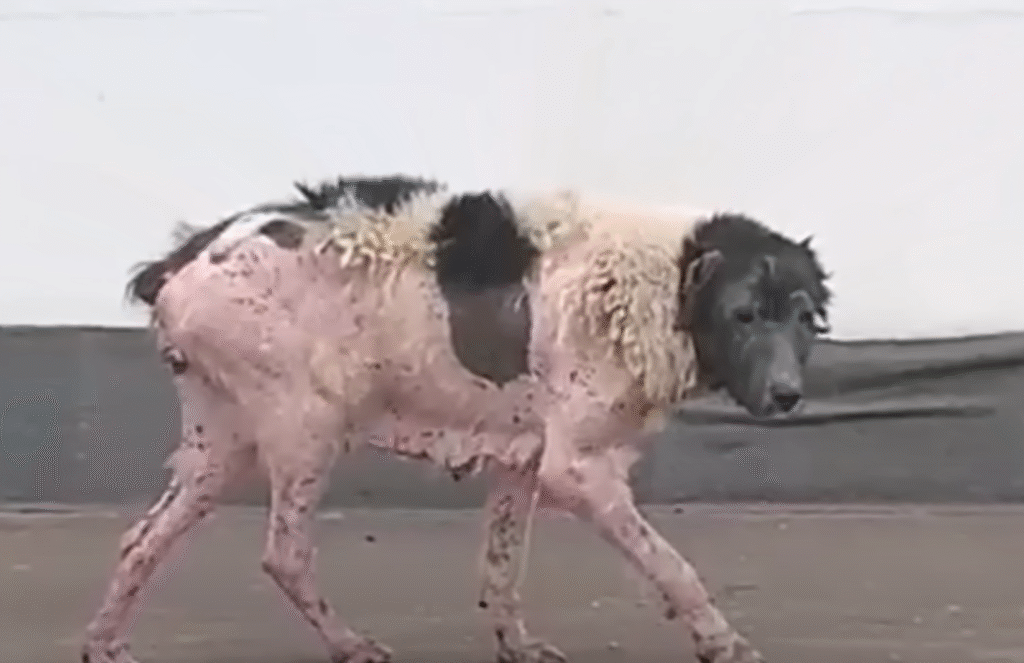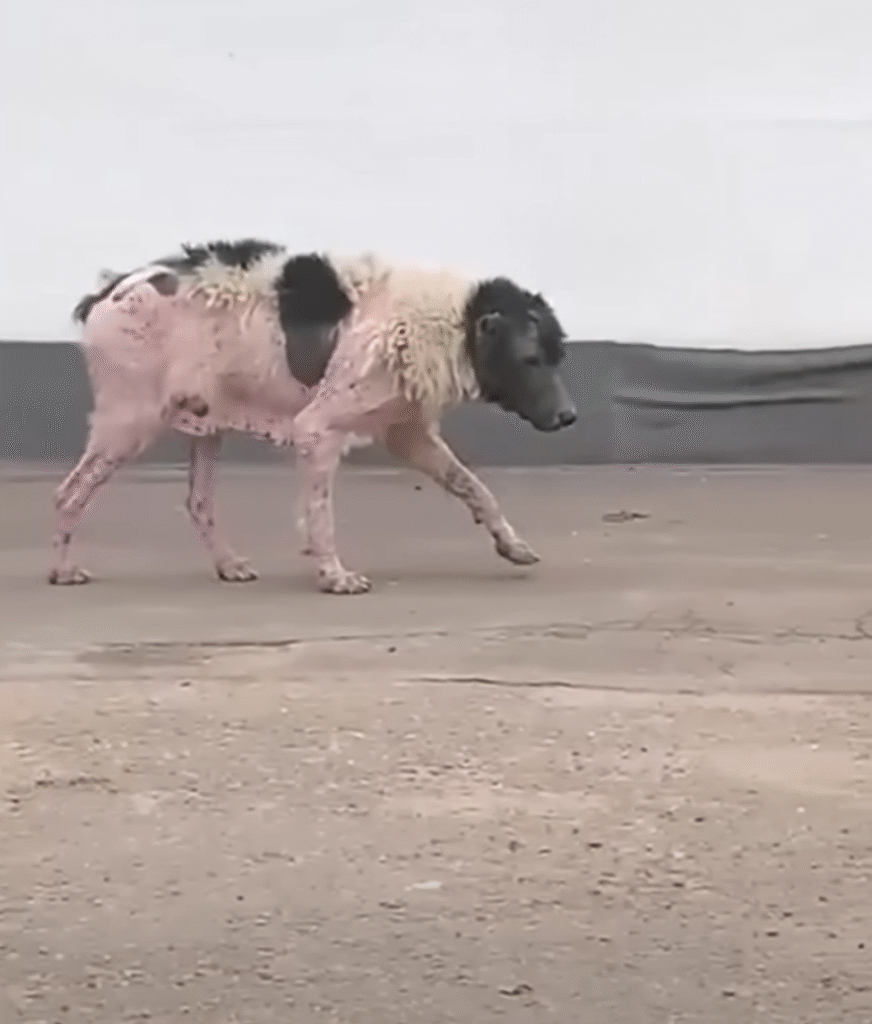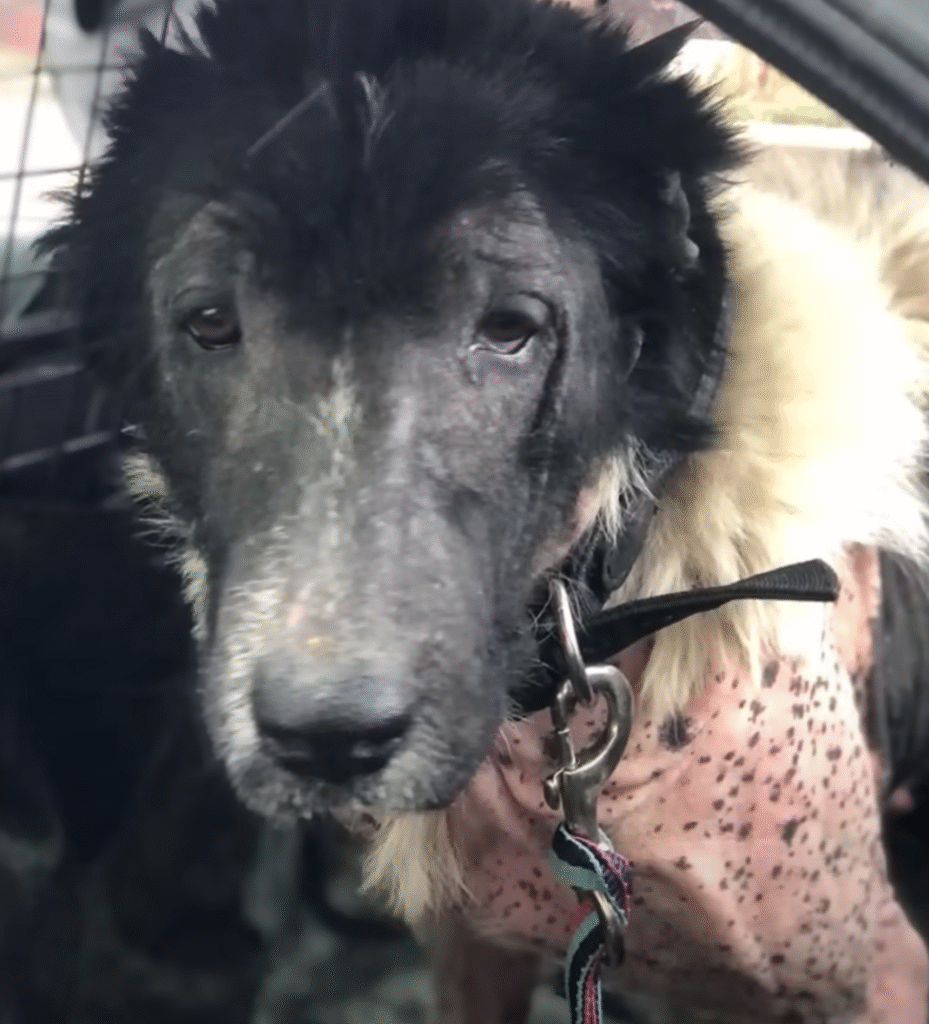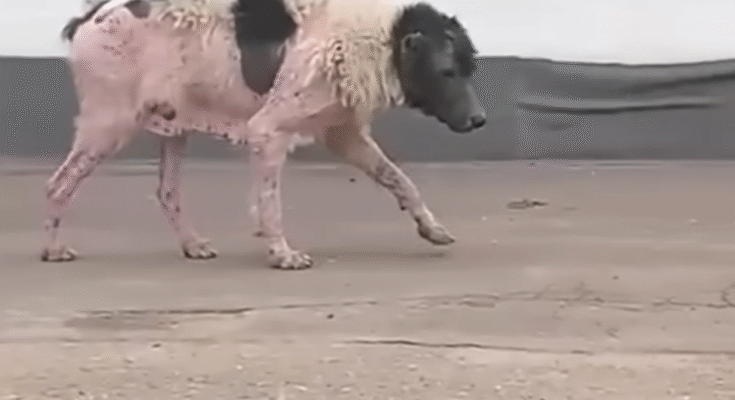For as long as he could remember, life had been one long road of rejection. He was born different. While other dogs were admired for their sleek coats and bright eyes, he came into the world with twisted legs, patchy fur, and scars that grew with him. His muzzle was crooked, and one of his eyes never opened fully. To most who saw him, he was simply “ugly.”
He learned quickly that people noticed appearance before anything else. Whenever he tried to approach, hoping for food or kindness, the reactions were always the same—disgust, pity, or worse, cruelty. Children laughed, adults waved him away, and sometimes stones were thrown to drive him off.
And so, he wandered.
Every alley, every roadside, every abandoned field became his home. He scavenged for scraps, drinking from dirty puddles, hiding whenever larger dogs appeared. He never stayed long in one place. He had no one. No family, no pack, no human to care for him. He was a shadow moving through a world that didn’t want to see him.

Each time he caught sight of other dogs being walked on leashes, their coats shiny, tails wagging, he would stop and watch. Not out of jealousy, but with a quiet ache in his heart. They were cherished, respected, seen. He, on the other hand, was invisible—unless his “ugliness” made someone point and mock.
Day after day, year after year, he wandered.
And yet, despite the rejection, he kept surviving. Somewhere deep inside, hope flickered like a small flame. Perhaps it was instinct, perhaps something greater, but he carried on, step after painful step.
One chilly evening, weak from hunger, he stumbled into a small town. His legs shook as he limped along the sidewalk. A group of teenagers spotted him and laughed.
“Look at that thing!” one shouted.
“Gross! Don’t let it touch you!” another cried, throwing a stick in his direction.
The dog lowered his head and turned away, his heart aching. He had heard it all before. Still, every insult cut deeply, reminding him of his place—an outcast, unwanted, unloved.
He found shelter under a bench and curled into himself. His body was ugly, yes. But inside, he felt something more: loneliness heavier than his bones.
That night, he dreamed of something he had never known—what it might feel like to be looked at with kindness instead of disgust.

The next morning, fate intervened.
A man named Elias, older and weathered but gentle in demeanor, walked through the square carrying a basket of bread. He noticed the dog under the bench. Most people passed without a glance, but Elias stopped.
The dog tensed. His instinct screamed: Don’t look at me. Don’t come close. I know what happens next.
But the man didn’t sneer. He didn’t chase him away. Instead, he knelt down slowly, setting the basket aside.
“You’ve been wandering a long time, haven’t you?” Elias said softly.
The dog blinked, startled. No one had ever spoken to him that way—as if he were someone, not something.
Elias extended a piece of bread, not forcing it, just leaving it within reach. The dog hesitated, then cautiously stretched his neck forward and took it, his teeth brushing the man’s fingers. He waited for the angry shove that usually came afterward. But it never came.
Instead, Elias simply smiled. “Good boy.”
For the first time in his life, the dog’s chest ached not with pain, but with something unfamiliar—recognition.

In the days that followed, Elias returned, bringing food and sitting quietly near the dog. He never reached out suddenly, never forced contact. Slowly, the dog began to wait for him. His tail, once lifeless, twitched with the smallest wag when he saw the man approach.
Other townspeople noticed. Some scoffed, whispering, “Why waste time on that ugly creature?” But Elias ignored them. To him, the dog’s worth wasn’t in his appearance, but in his survival, his quiet resilience.
One day, as Elias laid a blanket on the ground and sat beside him, he placed his hand gently on the dog’s head. The dog stiffened, but instead of pulling away, he stayed. Warmth spread from that touch, reaching places no one had touched before—not his body, but his soul.
For the first time, he felt… respected.
His eyes filled with silent tears. Not loud sobs, not cries of fear, but tears that slipped down because he didn’t know how else to respond. All his life, he had been told he was ugly, worthless, something to be avoided. Yet here was a man who saw him differently.
Elias took him home soon after, naming him “Valor.”
At first, Valor didn’t understand. A soft bed, bowls of clean water and food, a roof over his head—these were things he had never known. But even stranger than the comfort of home was the way Elias treated him.
Not as an object of pity. Not as an ugly burden. But with respect.
When Elias spoke, he looked into Valor’s eyes as if he were an equal. When they walked together, Elias held his head high, unashamed of the dog at his side. Even when others whispered, Elias responded firmly, “This dog has survived more than any of you could imagine. He is beautiful to me.”
Those words shattered the last of Valor’s doubts.
He was no longer just a wandering shadow. He was a being of value, deserving of dignity.
Over time, Valor grew stronger. His fur thickened, his eyes brightened, and though his body still carried scars and deformities, he carried them proudly now. Each mark was proof of his survival, each imperfection a story of endurance.
Children in the neighborhood, once frightened, began to approach. At first cautious, then curious, then affectionate. They saw what Elias saw—that beneath the rough exterior was a soul overflowing with gentleness.
Valor learned to lean into hugs, to close his eyes when hands scratched behind his ears, to wag his tail without fear of being mocked.
And every time someone showed him kindness, his eyes glistened with the same silent tears.
Because he remembered. He remembered the years of wandering, the cruel laughter, the loneliness. He remembered what it felt like to be shunned for being “ugly.” And now, the contrast was so overwhelming that he could hardly contain it.
Wandering all his life with an ugly body, he silently cried as he was respected.
No longer a nameless stray, no longer invisible. He was Valor—loved, valued, honored for who he was.
And in his heart, he finally believed the truth Elias had shown him: beauty was never in the body, but in the soul that kept walking despite everything.
Word Count: ~1,030
Would you like me to make this story more realistic (like a true rescue account) or keep it more like a heartwarming fable with strong emotional imagery?



